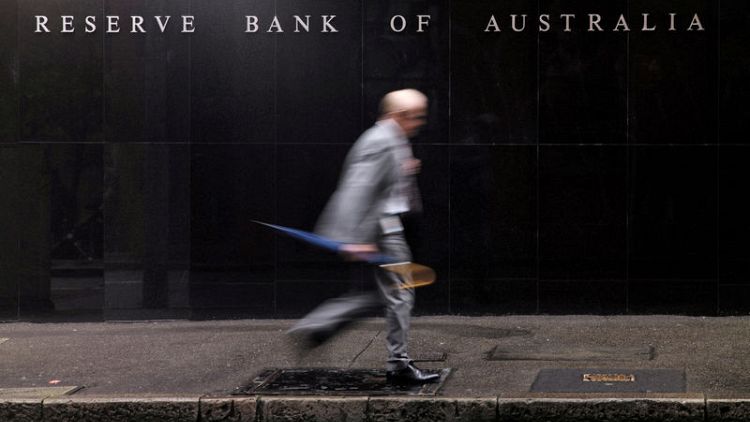By Wayne Cole and Swati Pandey
SYDNEY (Reuters) - Australia's central bank entered its third year of policy stability on Tuesday, and a change seems no nearer even as its commercial cousins nudge up their home loan rates to protect profit margins.
The Reserve Bank of Australia (RBA) ended its September board meeting with rates held at an all-time low of 1.50 percent and signalling a steady policy ahead.
Even though the status quo decision was widely expected, the Australian dollar bounced more than a quarter of a U.S. cent to reverse early losses as Governor Philip Lowe sounded staunchly upbeat about the A$1.8 trillion economy.
"In the first half of 2018, the economy is estimated to have grown at an above-trend rate," Lowe said.
"Business conditions are positive and non-mining business investment is expected to increase."
Still, the bank was in no hurry to hike, given wage growth and inflation remain uncomfortably low.
An added reason for caution was a recent increase in mortgage rates by Australia's No.2 lender Westpac.
Westpac's move had led interbank futures to push back the chance of a hike to early 2020 as traders wagered other banks would follow suit, leading to a de-facto tightening in the market.
However, Lowe did not acknowledge Westpac's move in his short statement while repeating average mortgage rates were still lower than a year ago. He also appeared comfortable about a slowdown in the housing market, saying there was still competition in the market for good-quality borrowers.
"The RBA is cautious by nature, reluctant to take risks, and that is a sound approach in the current climate," said Callam Pickering, APAC economist for global job site Indeed.
Pickering cited mortgage rate hikes by Westpac as one reason for the RBA to stay on the sidelines.
"Even if the economy was in a strong spot, why would the RBA bother hiking when the banks are doing it for them?"
UPBEAT ECONOMY
Second-quarter gross domestic product (GDP) figures due on Wednesday are seen likely to show the economy notched up its 27th year without a recession, with expectations cemented by data out earlier.
Government spending, which accounts for almost a quarter of annual GDP, rose 1 percent in the second quarter.
Other data showed net exports added around 0.1 percentage points to GDP in the quarter, thanks in part to strength in rural goods, energy and tourism.
A median of 16 analysts polled by Reuters forecasts GDP growth of 0.7 percent in the June quarter from the March quarter when it rose 1.0 percent. Annual growth likely slowed to a still-solid 2.8 percent, from a surprisingly rapid 3.1 percent the previous quarter.
The RBA is still predicting growth of a little above 3 percent for this year and next, with a boom in infrastructure spending driving much of that expansion.
But fears of a global trade war and strains in emerging markets have also reinforced investors' suspicions that rates will stay low for a long time to come.
"With the full effect of tighter lending conditions, falling house prices and a weaker global backdrop yet to be felt, such an acceleration in growth looks like a pipe dream to us," said Paul Dales, Sydney-based chief economist at Capital Economics.
"If so, then wage growth and underlying inflation are unlikely to rise as the RBA is hoping, which would make it very challenging for the RBA to build the case for a rate hike before the end of next year."
(Editing by Shri Navaratnam and Eric Meijer)



